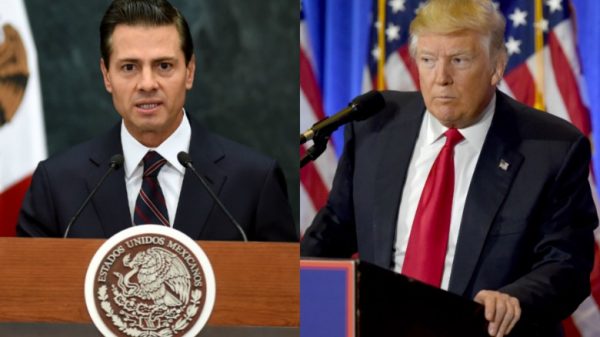
Talk of a possible 20 percent tax on U.S. imports from Mexico raised eyebrows Friday in Asia, where exports to the U.S. drive growth in many economies.
Reaction to the news was more muted than it might have been, however, since much of the region was closed for lunar new year holidays.
Japanese officials said Friday they hoped to meet soon with U.S. officials. Finance Minister Taro Aso said the Japanese side should “thoroughly explain” how Japanese companies have been contributing to American society, including creating jobs.
“It would be important to exchange opinions to accurately convey the reality and establish a steady relationship,” Aso told reporters.
President Donald Trump’s press secretary Sean Spicer said the 20 percent tax was among several options to finance building a wall along the U.S. southern border, but no decision has been made.
Mexican President Enrique Pena Nieto (PAYN’-yuh nee-EH’-toh) scrapped a scheduled trip to Washington next week over the issue. He has flatly rejected Trump’s assertion that Mexico will pay for the wall on its border.
The peso fell 0.6 percent against the U.S. dollar, to 21.35 pesos to the dollar but recovered to about 21.23 late Friday in Asia. The Japanese yen also weakened against the dollar, to 115.23 yen from Thursday’s close of 114.46 yen.
China’s official Xinhua News Agency reported that Trump was considering the 20 percent tariff without any editorial comment. However, the report cited unnamed analysts saying Trump would have to withdraw the U.S. from the North American Free Trade Agreement, or NAFTA, to be able to impose such a tax. Trump has said he wants to renegotiate NAFTA.
Though he did not refer directly to Trump, in remarks marking the eve of the lunar new year on Friday, Premier Li Keqiang said, “Above all, we remain convinced that economic openness serves everyone better, at home and abroad.
“The world is a community of shared destiny. It’s far preferable for countries to trade goods and services and bond through investment partnerships than to trade barbs and build barriers. Should differences arise, it behooves us all to discuss them with respect and a keen sense of equality,” he said.
Uncertainty over future trade ties with the U.S. rose after Trump pulled the U.S. out of a Pacific Rim trade initiative, the Trans-Pacific Partnership, that formed the centerpiece of former President Barack Obama’s moves to strengthen U.S. economic ties in the region.
It’s unclear how much of Trump’s campaign rhetoric will become reality, said Kent Calder, director of Asia Programs at Johns Hopkins School of Advanced International Studies.
“But the general symbolism that America is growing protectionist I think deeply concerns almost all Asian countries because they are pre-eminent exporters, and many of them heavily dependent on exports and so that has major implications for them, even if this is specifically aimed first of all at Mexico,” he said.
Japan’s chief government spokesman refused comment on tensions over the border wall, but said Tokyo was watching for any impact on Japanese companies.
A steep tariff on exports from Mexico to the U.S. would pinch manufacturers like Toyota Motor Corp., which like nearly all other automakers builds small cars in Mexico to take advantage of its lower wages.
Toyota employs thousands of people at factories in the U.S, but it also is planning to build a plant in Mexico to make the popular Corolla subcompact.
About 70 percent of the vehicles Japanese car makers sell in the U.S. are made in the U.S., but a tax on cars exported from Japan – 1.8 million last year – would “clearly be a major headwind,” Capital Economics’ economists Marcel Thieliant and Mark Williams said in a report issued Friday.
Trump also has threatened to impose steep tariffs on imports from China, which ran a $319 billion surplus with the U.S. in January-November 2016, compared with Japan’s $62.4 billion surplus and Mexico’s $60 billion, according to U.S. figures.
Associated Press

Leave a Reply
You must be logged in to post a comment.